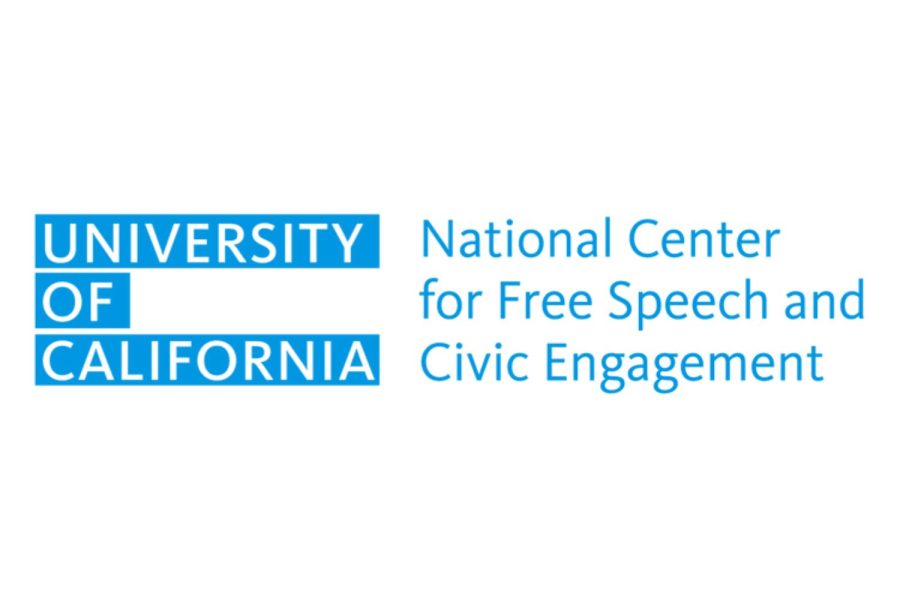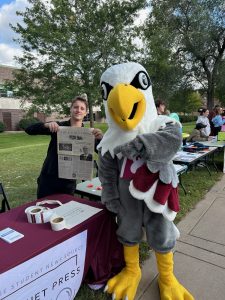The #SpeechMatters 2023 conference: “Is social media helping or harming democracy?”
March 27, 2023
On Thursday, March 23, the #SpeechMatters 2023 conference was hosted by the National Center for Free Speech and Civic Engagement. The meeting was held in the Student Union room 3110 where people gathered to watch the virtual conference from 11:00 a.m. to 3:00 p.m.
The #SpeechMatters movement is a group that is fighting for Democratic Freedoms in the United States. According to the Free Speech Center, “In this panel, experts representing industry, faculty, and advocacy groups consider the intersection of technology and expression, answering the essential question: is social media helping or harming democracy?”
The meeting began with the University of California (UC) National Center for Free Speech and Civic Engagement Executive Director Michelle Deutchman and UC President Michael V. Drake. Drake said, “Like democracy, discovering, creating, and disseminating new knowledge is an endlessly hopeful endeavor. It can give us faith in the power of humans to work toward a better future and to ensure access and opportunity for all to participate in learning and create new knowledge. It is critical to our robust democracy led by citizens empowered to choose their own destiny.”
The meeting was moderated by the Chair of the Board of Directors of the Center for SafeSport Jessica Herrera-Flanigan. She began by welcoming the Research Director of the Shorenstein Center on Media, Politics and Public Policy Joan Donovan to talk about the question “Is social media helping or harming democracy?”
“Social media’s role in democracy is obviously very paradoxical…Social media platforms, such as Facebook, were weaponized by different groups, dangerous organizations, and governments to harm populations,” said Donovan, “Political and financial elites use that affordance… usually it is done so in a way to oppress the masses or to shape media agendas.”
Donovan also said, “Now it is very easy to deliver a payload of disinformation to the public reaching millions of people instantaneously with claims that the election had been defrauded, or that something nefarious is happening in local politics. Also, in terms of money or your life… Medical misinformation has become a very important and almost impossible-to-ignore problem facing our societies. There is actually a cost to all of this misinformation.”
Herrera-Flanigan then invited Co-Chief Executive Officer (CEO) of Free Press and Free Press Action Activist Jessica J. González to speak. González said, “Social media is a tool, and like a hammer, it can be used to build beautiful things, but it can also be used to crush skulls… Social media has been used to raise awareness on a range of issues from police violence, to family separation, to women’s rights, climate justice, and more.”
“It [social media] also has helped people participate more fully in our democracy, right? Debating the issues of the day without leaving our homes, especially during the pandemic… It also helps us learn from people that are different from us… [social media] has lowered the communications barriers for people of color and others, who have never been well represented by mainstream media gatekeepers,” said González.
González continued, “There is also a vocal, and extreme minority who seek to use social media to crush skulls… If we don’t stand up to these bullies our democracy is at risk. White supremacists, white nationalists, conspiracy theorists, are using social media to sew chaos, normalize bigotry, and undermine democratic institutions.”
When answering the question “Is social media helping democracy?”, González said, “No, right now social media companies profit off selling our attention to advertisers. High-engagement content like divisive hate and conspiracy theories keeps users glued to their screens. So the incentives here are all wrong; Algorithms feed content designed to keep us engaged, and they micro-target ads and content based on a carefully curated dossier of our demographic and other sensitive data. They are appealing to our interests, and even more cynically, to our vulnerabilities. The United States has failed to adequately regulate these companies and their exploitation of our private information which has resulted in human and civil rights abuses.”
Afterward, Herrera-Flanigan invited the Director of the Tow-Knight Center for Entrepreneurial Journalism at Craig Newmark Graduate School of Journalism Jeff Jarvis. Jarvis cited Nirit Weiss-Blatt who examined media coverage of the internet.
Jarvis said, “She found that the moment that it [media coverage] changed from utopian to dystopian. That moment in her data was the election of Donald Trump… I fault my colleagues in journalism and media for their coverage of the net because it was simplistic on both sides. It was simplistically optimistic, now it is simplistically pessimistic.”
“We have to bring perspective into the discussion about the platforms and social media and technology. I fear that what is happening at this very moment where we are right now is that the hearing is going on in Washington about TikTok. A combination of moral panic about technology and about the children – we must do something! Xenophobia about China may lead to the banning of Tik Tok. But what I see when that occurs is the printing press of a hell of a lot of people gets torn out of their hands. That is an issue for freedom of expression, the First Amendment in this country, and the value of speech… It is not just about the press, as an institution, it is about speech and speech for all. It is also about assembly; it is also about the action of not being able to petition grievances as occurs in the hashtags #BlackLivesMatter, #MeToo, and #OccupyWallStreet,” said Jarvis.
Jarvis said, “The greater context here is about speech – protecting speech. Which always means that we have to protect bad speech and we have to grapple with it and create institutions to help us ignore it and not spread it so that we can have good speech.”
This conference was promoted by UWL’s Joint Committee on Free Speech Promotion and the Center for Transformative Justice.







